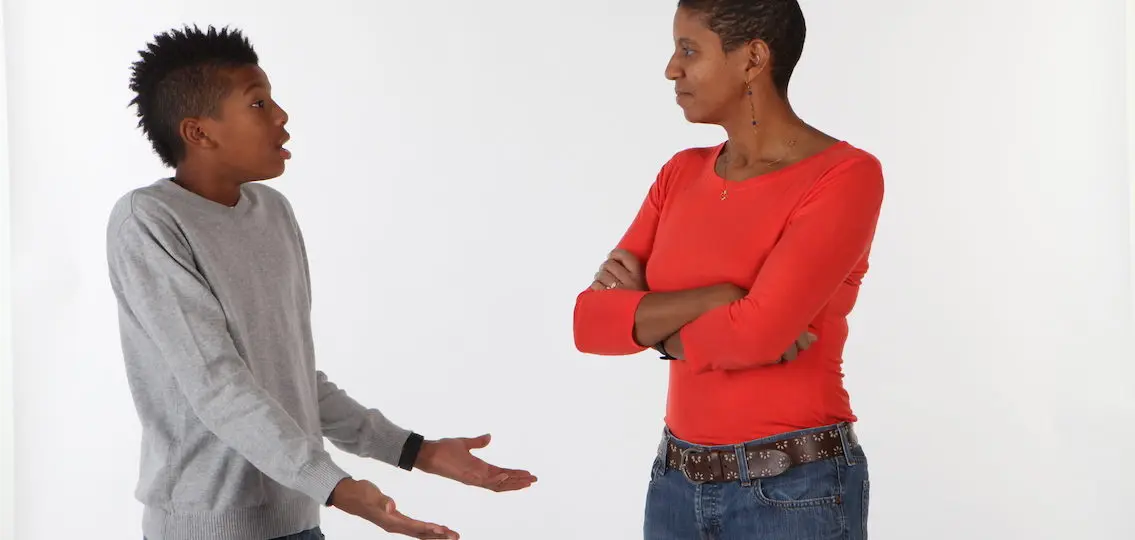As a parent, it’s impossible to keep the peace all of the time. I would have to say yes to everything and allow my kids to do things that I know aren’t good for them. Saying yes all the time might be easier, but it wouldn’t be more helpful and it wouldn’t be effective parenting.

As a therapist and former school counselor, the most common complaint I hear from teens is that parents don’t listen, don’t understand, or don’t care how they feel. I have also worked with enough loving, supportive parents to know that this couldn’t be further from the truth. So, what’s the disconnect? Often, the way we respond to our kids during disagreements leaves them feeling like we are the bad guy and it’s us versus them.
Typical Parent Responses
We typically have one of three responses as a parent:
1. The authoritative response
Sometimes we don’t feel like explaining ourselves and just wish our kids would respect our decision because we are their parent and know what’s best for them. “Because I said so” is a perfect example of an authoritative response.
2. The explanation
We try to explain the “why” behind our decision. We want our kids to understand our perspective and we think that by telling them our reasoning they will understand and accept our position. For example, your child wants to drive to a friend’s house—but it’s pouring out and your gut feeling tells you it’s not a good idea. Your child gets angry and upset at your response, so you explain your reasoning: “You haven’t had your license for very long and you could get into an accident in this kind of weather.”
3. The feelings argument
As adults we have vastly different perspectives than our teens and we don’t always get why something is so important to them. We view their emotions and responses as overreacting. An example of this type of response would be, “Why do you need to go out in the pouring rain? You will see your friend tomorrow. It’s not that serious.” “It’s going to be fine” and “It’s not that big of a deal” are two other classic examples.
As a parent, and even in my work as a school counselor, I often leaned on response number 2. I felt that, if I could just explain my reasoning, they would see it my way and understand. But I was expecting them to see my side without ever trying to see theirs. When they didn’t see my side and got upset or frustrated, I then shifted to response number 3 and explained why they shouldn’t be upset. Have you ever had someone tell you that you’re overreacting? My husband has, and it didn’t go well.
Validation: A More Effective Parenting Strategy
So how can I parent effectively without always being seen as the bad guy? I realized that if I validated their feelings before responding, I could make them feel heard, understood, and valued. Validation is as simple as recognizing that someone’s feelings or opinions are valid or worthwhile. Validating my children’s feelings doesn’t mean I agree with them, it means that I recognize that they are entitled to those feelings. Skipping validation caused a huge disconnect, but remembering to use validation is a game changer and made me a more effective parent.
Here are a few ways to use validation with your teen, using the example of driving in the rain:
- You seem really disappointed.
- It sounds like you really wanted to hang out with your friend.
- I know it’s frustrating and disappointing when you can’t do something fun.
- It sounds like you were really looking forward to getting out of the house for a bit and hanging out.
- It’s tough when you feel like you are missing out on something.
The five statements above are examples of simple ways to validate your child’s feelings and allow them to feel heard and understood. It can seem counterintuitive to use validation when our kids start arguing with us. They can push our buttons and we can lose our tempers.
“I hear you and value your feelings and opinions, but I still can’t let you go to your friend’s house” will be received differently than a statement like “Because I said so” that doesn’t validate their feelings.

As parents, there are times when we have to say no and our kids aren’t always going to like our response. However, using validation is an effective parenting strategy that will fuel connection and deescalate the situation—making sure our children always feel heard and understood.




